Dwarikadas built a hotel, Ambika built an estate

We use Google Cloud Translation Services. Google requires we provide the following disclaimer relating to use of this service:
This service may contain translations powered by Google. Google disclaims all warranties related to the translations, expressed or implied, including any warranties of accuracy, reliability, and any implied warranties of merchantability, fitness for a particular purpose, and noninfringement.

Highlights
- Dwarikadas bought land and built a house in Battisputli around 2015-16, Dwarikaj Hotel and Dhulikhel Resort born from that house has become a hospitality industry earning around 1 billion annually.



Closest to Tribhuvan International Airport in Kathmandu is a boutique-style hotel, Dwarikaj. Hotels located near international and domestic airports around the world are often the first choice of accommodation for tourists. Because, it is easy to transfer from the hotel to the airport.

However, according to the famous geologist Tony Hagen, Dwarikaj is not the choice of tourists just because it is close to the airport. Because, Dwarikaj is not only a hotel, it is also a living museum of South Asia's unique heritage and art heritage.
The Malla dynasty, which emerged from the 12th century, ruled the Kathmandu Valley for nearly 600 years until the 18th century. The specialty of the Malla period was the decoration of woodwork in temples, palaces, religious buildings and private houses. The Newari craftsmanship of that time is abundant in those carvings and sculptures. Due to lack of proper maintenance and care, the heritage of that time is not alive in many places now. However, Raithane Dwarikadas Shrestha of Makhan in Kathmandu preserved the heritage of Malla through a hotel.
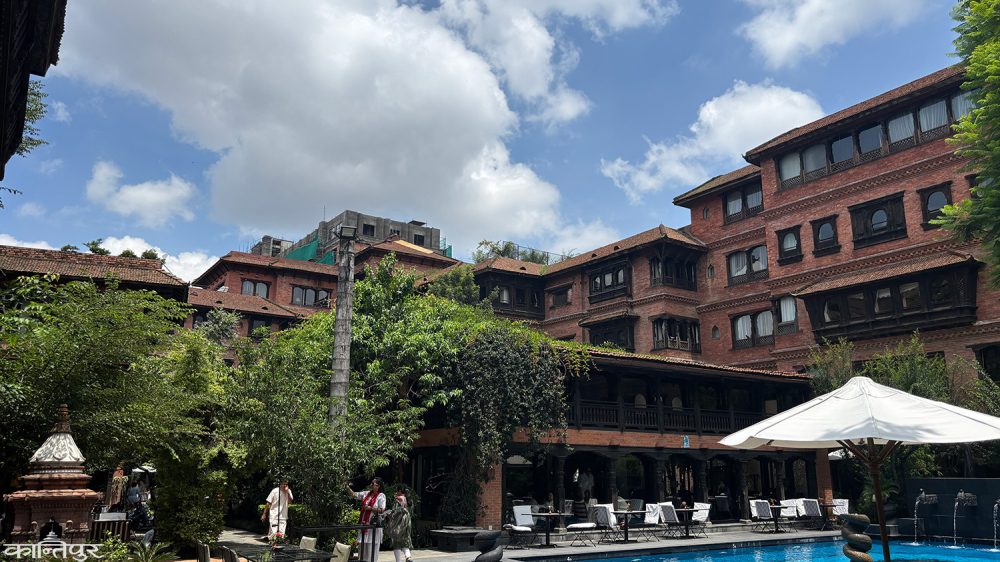 Today, Dwarikaj has become synonymous with boutique-style hotels in Nepal. According to Vinayak Shah, central president of Hotel Association of Nepal (HAN), when the private sector builds a hotel, it has become the norm to say 'Dwarika-like'.
Today, Dwarikaj has become synonymous with boutique-style hotels in Nepal. According to Vinayak Shah, central president of Hotel Association of Nepal (HAN), when the private sector builds a hotel, it has become the norm to say 'Dwarika-like'.
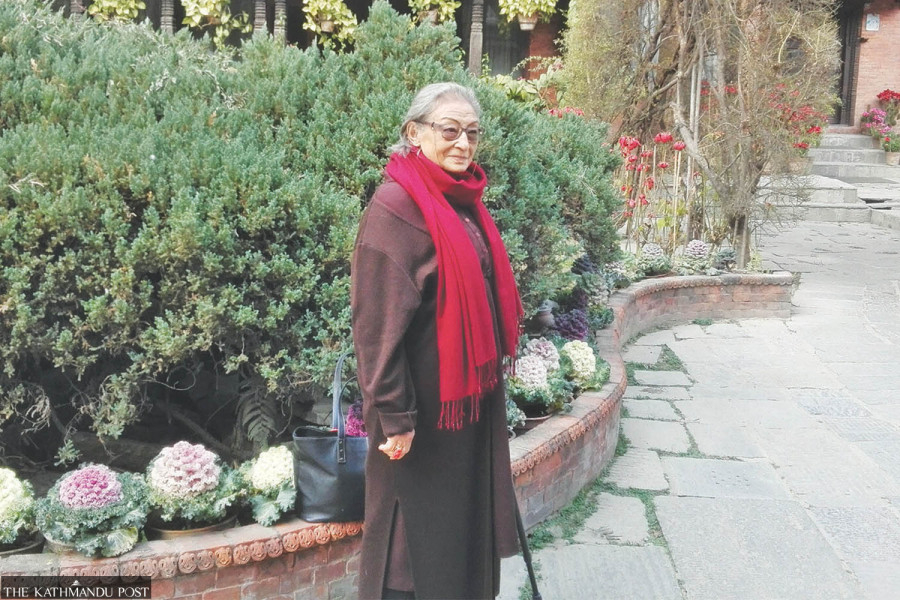 Registered in 2034 Dwarikaj Hotel For history buffs, the then Kantipur, Bhadgaon and Lalitpur (Kathmandu Valley) was a well-faced geologist's comment. "Dwarikaj has shown that heritage can be protected and used for more purposes," he said in his public speech about Dwarikaj, "In fact, this is an example of what should be done to preserve the form of Kathmandu Valley." It is one step in a big and vast task to restore the uniqueness and beauty of Kathmandu. It is now facing uncontrollable environmental stress and modernization.'
Registered in 2034 Dwarikaj Hotel For history buffs, the then Kantipur, Bhadgaon and Lalitpur (Kathmandu Valley) was a well-faced geologist's comment. "Dwarikaj has shown that heritage can be protected and used for more purposes," he said in his public speech about Dwarikaj, "In fact, this is an example of what should be done to preserve the form of Kathmandu Valley." It is one step in a big and vast task to restore the uniqueness and beauty of Kathmandu. It is now facing uncontrollable environmental stress and modernization.'
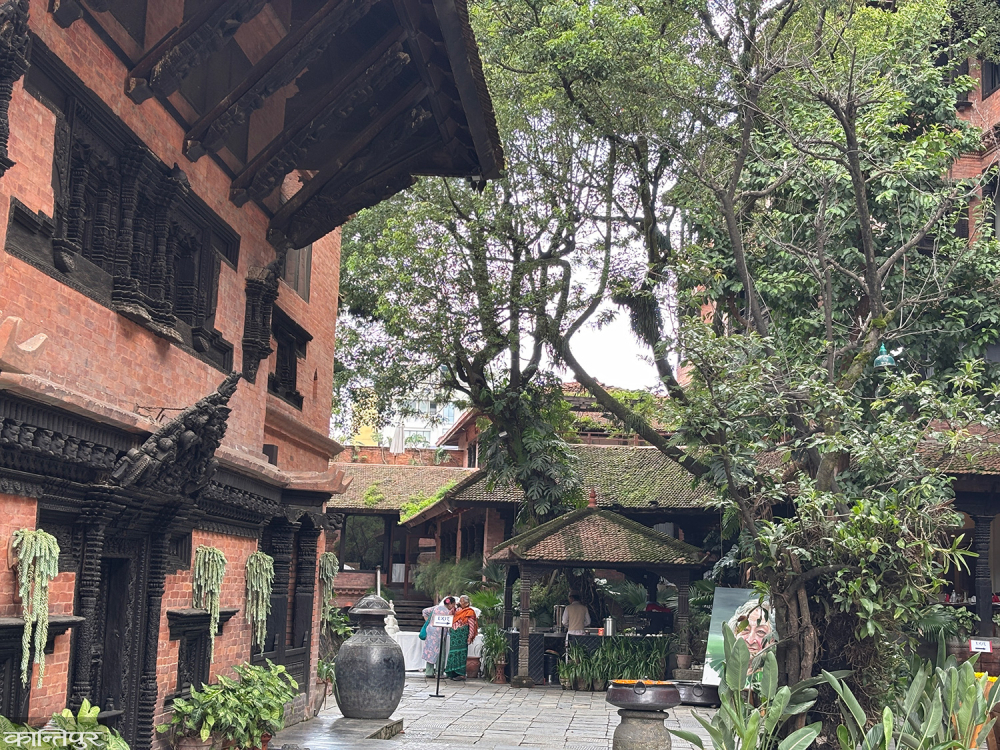 This is a living proof that the tourism sector should not destroy the heritage and environment sector. That is why, as much as well-wishers were shocked by the death of the founder Ambika Shrestha at the tribute ceremony held at the Dwarikaj Hotel complex in Battisputli, Kathmandu on Saturday, they seemed to be comforted by the message given by Shrestha, a businesswoman, on how to protect heritage.
This is a living proof that the tourism sector should not destroy the heritage and environment sector. That is why, as much as well-wishers were shocked by the death of the founder Ambika Shrestha at the tribute ceremony held at the Dwarikaj Hotel complex in Battisputli, Kathmandu on Saturday, they seemed to be comforted by the message given by Shrestha, a businesswoman, on how to protect heritage.
"This property has now become a heritage that should be protected not only by a single person but also by the state," Yankila Sherpa, the former state minister for tourism, said, "A small 10-room hotel started by Ambikaji and her husband Dwarikadas Shrestha from a barn has become a tourist product that represents Nepal today. This is a heritage site that shows Nepali art and culture to the world.'
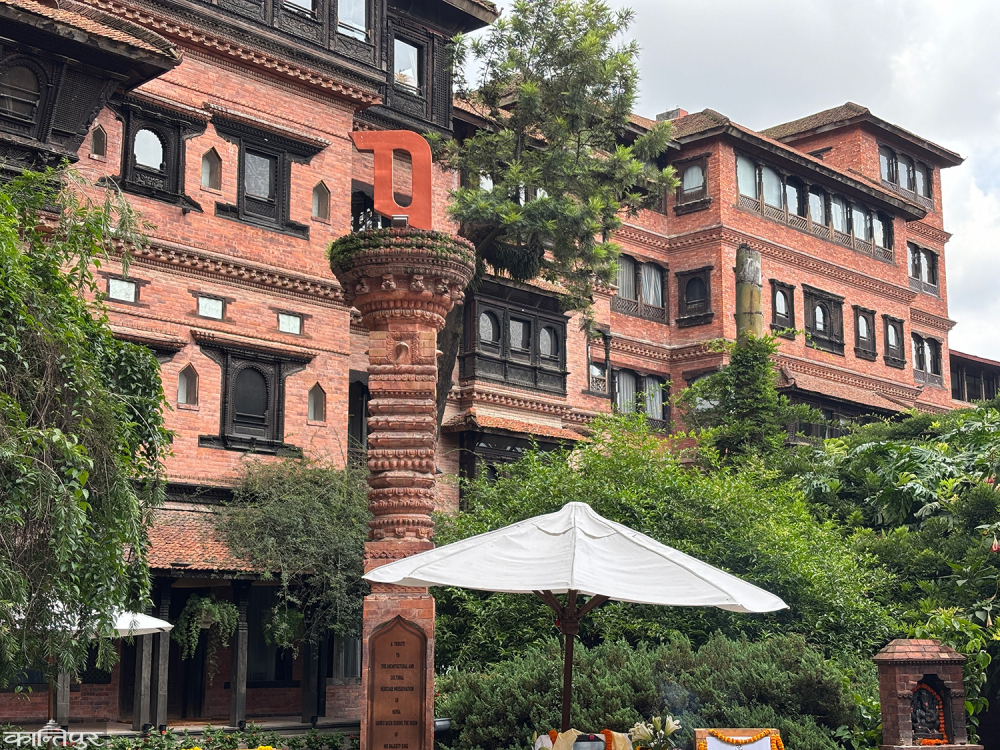 Photo: Suraj Kunwar/Kantipur
Photo: Suraj Kunwar/Kantipur
Dwarikaj is the choice of tourists visiting Nepal and special guests. Even if the distinguished guests are staying in any other five-star hotel in Kathmandu, they still reach Battisputli to taste the dishes that reflect Dwarikaj's elegance. Whether it is the King of Qatar, who recently visited Nepal on a state visit, or former US President Jimmy Carter, founder of the Carter Center, which monitors Nepal's elections, everyone was drawn to Dwarikaj's Krishna Arpan restaurant.
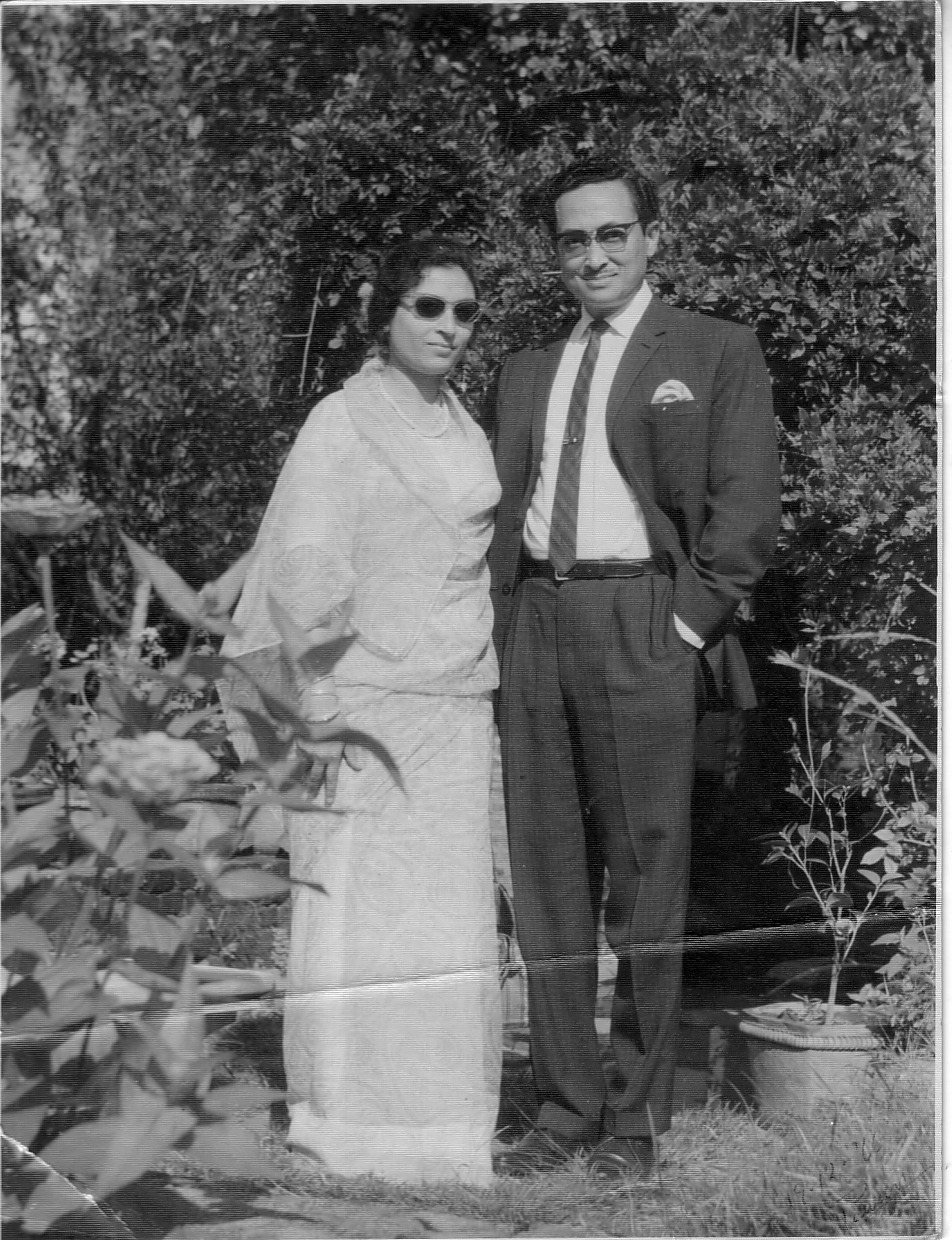 Dwarikadas along with his wife Ambika
Dwarikadas along with his wife Ambika
Dwarikaj's 'signature' in this 'venue' serves 22 Nepalese dishes ranging from Dhindo to Newari dish Chhoyla. Dressed in the costumes of Tharu, Magar, Newar, Tamang, Kshatriya, Brahmin, and other Nepali ethnic groups, the staff here serve in hospitality, giving a glimpse of Nepal during the Malla era, and cook samaybaji, mushroom sekua, sikkarni, parsley pudding, mismas pickle, puri and vegetables.
How many dishes to eat? 6, 12 or 22! It depends on the appetite and choice of the guests,' said a senior chef of Dwarikaj, 'We will prepare a menu with all the Nepali dishes named after the guests.' The rules to wear and eat must be followed.
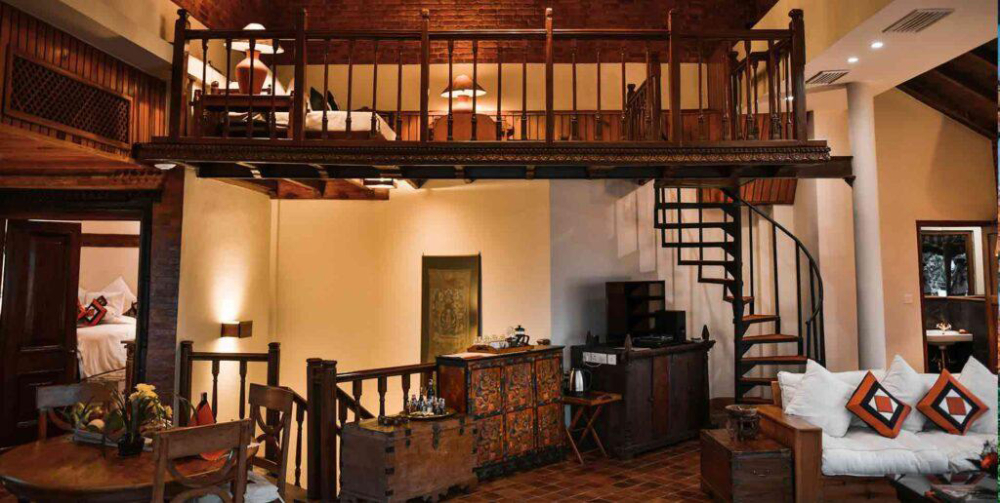 Dwarikaj Hotel's Royal Suite .
Dwarikaj Hotel's Royal Suite .
Here is another 'venue' pylon spread across the courtyard. Here you can taste the flavors from all over the world. Breakfast, lunch and dinner are prepared here while observing the architecture of Dwarika. It is open 24 hours a day for guests staying inside the hotel. For outsiders, it is open only for certain hours.
Dwarikaj decorates Japanese khankis at Mako's restaurant. Guests are served 'authentic' Japanese cuisine in a tranquil atmosphere and decor. A fusion bar is placed in the northern corner of Dwarikaj. The bar next to the pool (swimming pool) is another cozy cottage for meeting and chatting with friends. According to the marketing department of
Dwarikaj, the minimum cost per person of catering at these three venues is 38 USD (4 thousand 900) starting from the breakfast menu and up to 153 USD (19 thousand) for the dinner fee. There are 80 guest rooms here. These include Heritage Deluxe Room, Junior Suite, Executive Suite and Royal Suite. During the season, Heritage Deluxe Room costs $446 (Rs 57,000), Junior Suite $571 (Rs 74,000), Executive Suite $712 (Rs 92,000) and Royal Suite $2,535 (3 Lakh 29 thousand rupees).
As a campaign to protect natural heritage, Ambika expanded the branch of Dwarikaj Hotels and Restaurant Group to Dhulikhel in 2070. Dwarika Resort is operating in Dhulikhel with an area of about 393 ropani. This resort has been distributing the produce of its own agricultural farm to its guests. There are spas, meditation facilities, overlooking the Himalayan range. There, guests have to pay 7,600 dollars (about 1 million rupees) for a three-bed villa. According to the marketing department, the cheapest junior suite costs 620 dollars (80 thousand rupees). During monsoon (1st June to 31st August) menu prices in Kathmandu and Dhulikhel may fluctuate slightly due to low tourist activity.
Chief Accounts Controller Gopal Malla said that 480 Nepali people are now employed in both locations of Dwarikaj. According to him, both these resorts have annual turnover of around 1 billion. "This year, Dwarikaz Kathmandu has done 65 million rupees and Dhulikhel has done 35 million rupees," said Malla, who has been associated with the Dwarika Group for four decades Less than 5 percent of Nepal's total population was educated. At that time, Dwarikadas went to study in India and returned to Nepal with a degree in law and commerce. His family established the first Hotel Paras in New Road in 2009. At that time, there was a ban on the arrival of tourists in Nepal. Indian pilgrims visiting Pashupati were customers of the hotel. Taking money for lodging a pilgrim was considered a 'sin' at that time.
Dwarikadas bought land in Battisputli around 2015-16 and built a house. Born from that house, Dwarikaj Hotel and Resort in Dhulikhel has become a hospitality industry earning around 1 billion annually. Dwarikadas was collecting windows and doors that reflect old architecture even before moving to Battisputli. According to the information given by the hotel, the first window collected from 2010-015 can now be seen at the fusion bar of Battisputli.
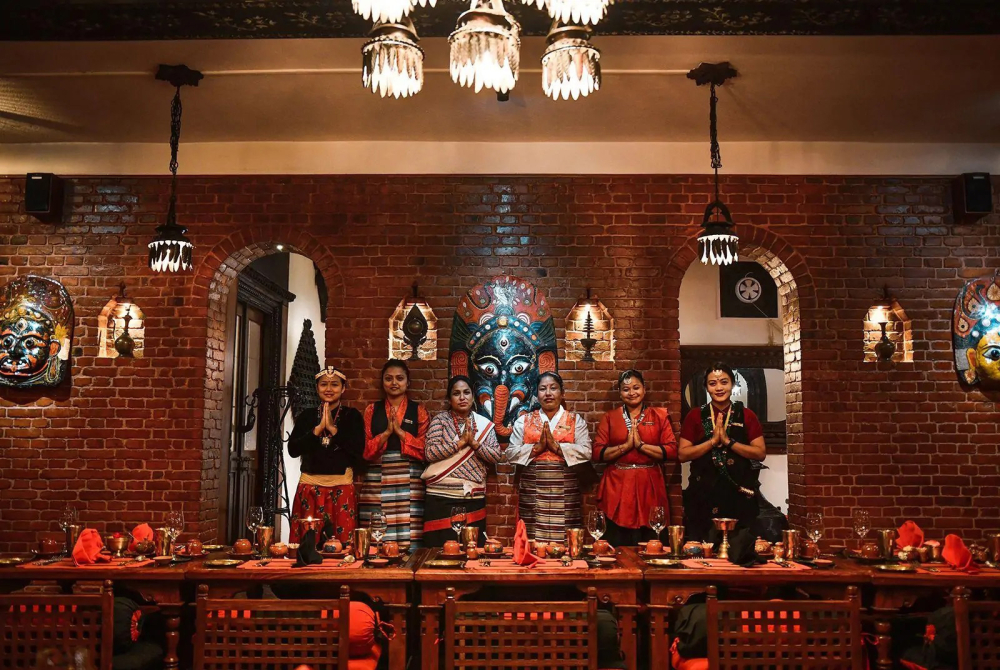 According to the Shrestha family, when Dwarikadas established the hotel by keeping the old windows and doors, many people discouraged him because of the poverty of the time. But he continued his campaign with his wife Ambika. Today, that property has become the cultural heritage and pride of Nepal. Many who wrote their memories in the memorial book kept at the tribute meeting for Ambika on Saturday seemed to mention that the noble couple had contributed to enriching Nepal's heritage.
According to the Shrestha family, when Dwarikadas established the hotel by keeping the old windows and doors, many people discouraged him because of the poverty of the time. But he continued his campaign with his wife Ambika. Today, that property has become the cultural heritage and pride of Nepal. Many who wrote their memories in the memorial book kept at the tribute meeting for Ambika on Saturday seemed to mention that the noble couple had contributed to enriching Nepal's heritage.
This campaign started on a cold morning in 2009. While walking towards Vasantpur, Dwarikadasa saw carpenters cutting wooden pillars with axes to light the fire. Without any plan of what to do in the future, he started collecting wood by buying the same pillar that had been burned by a fire from a carpenter. The care of this property, which attracts thousands of tourists, scholars and students every year, has now shifted to the shoulders of two daughters of the noble couple, Sangeeta and Vineeta.
Ambika Pradhan (Shreshtha), born on February 1, 1989 in Darjeeling, India, was married to Dwarikadas from Kathmandu in 2012 at the age of 23. After getting her school education from Loreto College and St. Joseph's College in Darjeeling, Ambika graduated in Arts from Patna University. After the death of Dwarikadas on 27th January 2048, she took over the entire responsibility of the hotel. At that time it was difficult for women to go out of the house.
Tourism entrepreneur, heritage activist Ambika died at the age of 92 on Thursday while undergoing treatment. Hundreds of businessmen, politicians, domestic/foreign diplomats, artists, his contemporaries gathered at Dwarikaj Complex in Battisputli on Saturday to commemorate his contribution. His family along with his two daughters Sangeeta and Vineeta paid their last respects to his body on Saturday.
 प्रकाशित : श्रावण ६, २०८१ ०८:५८
प्रकाशित : श्रावण ६, २०८१ ०८:५८

 २२.१२°C काठमाडौं
२२.१२°C काठमाडौं











